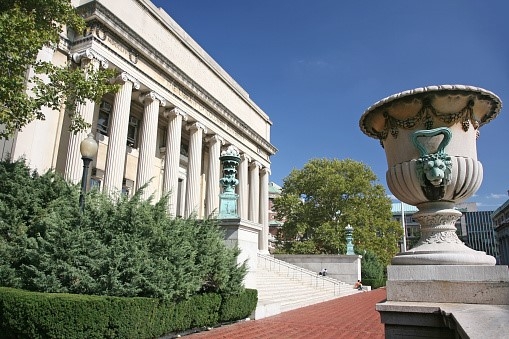You have /5 articles left.
Sign up for a free account or log in.

Terraxplorer/Getty Images
A class action suit was filed Sunday against 16 private colleges and universities, charging them with running a “cartel” and violating antitrust laws in the way they calculate aid awards, thus forcing thousands of students to pay more than they should have to in order to enroll.
The suit was filed by five recent graduates but seeks to be certified as a class action on behalf of thousands of additional students.
The targets of the suit are Brown, Columbia, Cornell, Duke, Emory, Georgetown, Northwestern, Rice, Vanderbilt and Yale Universities; the California Institute of Technology; Dartmouth College; the Massachusetts Institute of Technology; and the Universities of Chicago, Notre Dame and Pennsylvania.
The colleges are members of the 568 Group, which consists of 21 colleges and universities that claim a federal exemption from antitrust laws in developing and using a common methodology to award need-based aid. The exemption was created by Congress after the Ivy League colleges and MIT were charged by the Justice Department with price-fixing because they consulted one another on the aid to be given to students admitted to more than one institution.
In 1991, all eight members of the Ivy League and MIT were charged with price-fixing. The way it worked was that representatives from the colleges would meet to discuss their anticipated aid offers for students who had been admitted to more than one college. This practice limited price competition, prosecutors said. The colleges said the approach allowed students to choose colleges based on fit rather than on price. The issue was much debated, but the Ivy League colleges and MIT eventually agreed to end the practice.
The new suit acknowledges that the colleges have received an exemption from antitrust laws but says that nine of the colleges are not in fact need blind.
“At least nine defendants for many years have favored wealthy applicants in the admissions process. These nine defendants have thus made admissions decisions with regard to the financial circumstances of students and their families, thereby disfavoring students who need financial aid,” the suit says.
The nine are Columbia, Dartmouth, Duke, Georgetown, MIT, Northwestern, Notre Dame, Penn and Vanderbilt. The suit charges that they “have failed to conduct their admissions practices on a need-blind basis because all of them made admissions decisions taking into account the financial circumstances of applicants and their families, through policies and practices that favored the wealthy.”
Columbia University is criticized because its School of General Studies, which the suit says enrolls 2,500 undergraduates, doesn’t have need-blind admissions, according to the suit. “The burden of supporting Columbia’s preservation of prestige and financial accumulation therefore falls on those who can least afford it,” the suit says.
“Dartmouth and Notre Dame engage in need-aware admissions through ‘enrollment management,’” the suit charges. “This is ‘the systematic integration of the functions of admissions, the relationship between tuition and fees (pricing) and financial aid, and student retention, along with the use of research to inform institutional policies and practices.’ It is a ‘managerial paradigm’ that brings together admissions and other institutional functions ‘into a comprehensive institutional approach designed to enable college and university administrators to exert greater influence over the factors that shape their enrollments.’”
The suit also charges that “many defendants consider applicants’ ‘financial circumstances’ through admissions preferences given to the children of wealthy past or potential donors, such that their chances of admission increase significantly.” If a college does this, the suit charges, it should admit that it is not need blind.
At Northwestern, President Morton Schapiro has admitted that he personally makes decisions on hundreds of applicants a year. The applications on which he makes decisions include some children of donors or alumni and also children of faculty and staff members at Northwestern.
At Penn, the suit says, there are “‘tags’ to track applicants that are ‘a high priority for the institution.’ Penn tags the applications of ‘children of donors or potential donors.’”
And what about the other seven defendants? Brown, Caltech, Chicago, Cornell, Emory, Rice and Yale “have been members of the 568 Cartel during at least parts of the last two decades. These seven defendants may or may not have adhered to need-blind admissions policies, but they nonetheless conspired with the other defendants,” the suit says.
“In critical respects, elite, private universities like [the] defendants are gatekeepers to the American Dream,” the suit says. “Defendants’ misconduct is therefore particularly egregious because it has narrowed a critical pathway to upward mobility that admission to their institutions represents. The burden of the 568 Cartel’s overcharges falls in particular on low- and middle-income families struggling to afford the cost of a university education and to achieve success for their children. In addition, unlike prior admissions scandals, such as Varsity Blues, the 568 Cartel’s systematic suppression of financial aid is the official policy of its participants.”
“Varsity Blues took on the side door of admissions,” said Eric Rosen, the former federal and state prosecutor who led the Varsity Blues prosecution team and who is now a partner at Roche Freedman, one of the law firms filing the suit. “This case takes on the back door—alleging that, while conspiring together on a method for awarding financial aid, which raises net tuition prices, defendants also favor wealthy applicants in making admissions decisions. The law does not allow them to do both.”
None of the colleges that were sued released a detailed response, and most did not respond to Inside Higher Ed’s requests for comment. Others said that they never comment on litigation against the university.
Caltech said, “Caltech is currently reviewing the lawsuit and cannot comment on the specific allegations. We have confidence, however, in our financial aid practices.”
Yale’s director of media relations said, “Yale’s financial aid policy is 100 percent compliant with all applicable laws.”




